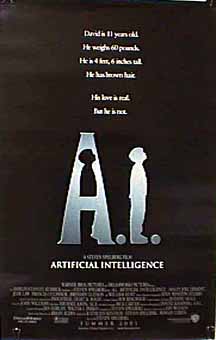Artificial Intelligence: AI

Artificial Intelligence: AI | ||
 |
Director: | Steven Spielberg | Actors: | Haley Joel Osment (as David), Jude Law (as Gigolo Joe), Frances O'Connor (II) (as Monica Swinton), Brendan Gleeson (as Lord Johnson-Johnson), Sam Robards (as Henry Swinton), William Hurt (as Professor Allen Hobby, the Visionary), Jake Thomas (as Martin Swinton), Ken Leung (I) (as Syatyoo-Sama), Michael Mantell (as Dr. Frazier at Cryogenic Institute), Michael Berresse (as Stage Manager), Kathryn Morris (I) (as Teenage Honey), Adrian Grenier (as Teen in Van), Clark Gregg (as Supernerd), Kevin Sussman (as Supernerd), Tom Gallop (as Supernerd) | Country: | USA | Category: | Drama | Year: | 2001 |
| Description: | A highly advanced robotic boy longs to become "real" so that he can regain the love of his human mother. | Comments: | "A.I" is set in the plausibly distant future, one we seem to be headed for. If you go see this for nothing else, check out the world Spielberg creates and how he makes you believe it. The visual effects are the best I've seen. This is likewise the most accurate rendering of the future I've seen. It isn't based on flights of fancy, but is honest about the direction the human race (well, at least here in the U.S.) is heading in. What's one of the first functions these robots that can think for themselves, created by humans to fulfill human needs, would be used for? Of course. There can be no denying that the Gigolo Joes and their female counterparts would be the first ones off the assembly line. In this story, many kinds of robots have been created and discarded for a newer model, just like today's computers. These robots serve humans, but are also self-reliant. These robots have will. They want to survive. This creates a paranoia about them, which leads to the dreaded Flesh Fair. Old junked robots are captured and destroyed in all kinds of creative ways before a cheering crowd--the future equivalent of BattleBots, WWF or Monster Trucks. The Fair and the scavenger robots it victimizes is but one of many great ideas "A.I." offers. When the Flesh Fair crowd finds out scientists have created a child, no one can believe it. Why make a child robot? What purpose could it possibly have? Before too long someone in the crowd figures it out: somewhere out there, there's a mama who lost her child or a man and woman unable to concieve. David is programmed to love his mother forever if he is read seven certainwords in a certain order. Once his love is turned �on', love in this case being a program that begins running, it cannot be turned off. This is very profound and meaningful, so I appreciate that the film doesn't konk you over the head with this: once you love someone--really love someone, not like puppy love, twitterpation, infatuation, even the love behind most marriages--but REALLY love, like the way a mother loves her child, it cannot be turned off. We often love people who don't love us back because that's just the way it is. We even love people who are mean to us. That's why it's love. It's not a decision, but a condition. Love can make you crazy, drive you to make weird choices--like abandoning your robot son in the woods to fend for himself because he's a danger to your real son. Yes, Monica does the compassionate thing, the right thing, and that's why it's so sad. Now David is lost and alone, without the one person that matters to him, also knowing that person can't love him because he's not a �real boy.' David believes he can become real with the help of the Blue Fairy from �Pinnochio,' which he doesn't understand is just a fairy tale. Aiding him on his quest: the aforementioned Gigolo Joe, who'd just like to turn that �blue' into something else. Hey, it's what he does (thank goodness Spielberg refrains from showing Joe teaching David how to dance and walk the way he does--not that there weren't a couple of threatening moments). I want to talk about the ending but I don't want to say �spoilers!' because then people won't read on. So I'll be as vague as possible and just say (gasp!), it worked for me. Many have said that one ending was enough. True, the Manhattan/Coney Island scene would've been a great ending for any film: a satisfying, open-ended, fitting (but very sad) close to the story. This was the only point where I wondered why it kept going. But as I watched on, it started to make sense. The film becomes very somber and visual (the Kubrick portion of the story if you will) or what others would call �slow.' Well, I'm a patient moviegoer so I'll sit through almost anything. This ending, however out of place it may feel, does tie up the story nicely. There are some parallels with the beginning and I like stories that end that way. Whether the film is better with or without this last half-hour I couldn't say. Maybe I'll go see it again and run away right when that moment comes. As for whether it's good or bad, which I haven't really expressed one way or the other--well, I have concerns. There's a whole lot of story here and it feels like too much even for a 2 and-a-half hour film. The first half is very good, but feels like merely the set-up for a bigger, bolder story to come. This bigger story never quite materializes. That there appears to be a lot more story available to tell makes me think this would have made a much better novel. Of course, they'd just try making it into a movie anyway. Grade: C |
Languages: | English | Subtitles: | Length: | 146 | Video format: | Audio format: | Resolution: | Files sizes: | 1453 |